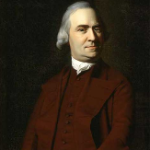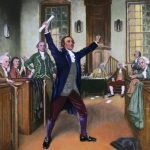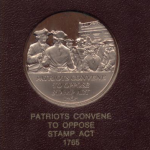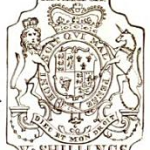Articles tagged with: stamp act congress
Stamp Act »

The Stamp Act Congress met in the Federal Hall building in New York City between October 7 and 25, 1765. It was the first colonial action against a British measure and was formed to protest the issued by British Parliament on March 1765. The Stamp Act Congress was attended by of nine of the thirteen colonies. Virginia, North Carolina and Georgia were prevented from attending because their loyal governors refused to convene the assemblies to elect delegates. New Hampshire did not attend but approved the resolutions once Congress was over.
Federal …
Stamp Act »

Representatives from nine colonies attended the Stamp Act Congress.
From Massachusetts: James Otis, Samuel Adams, Oliver Partridge and Timothy Ruggles.
From Rhode Island: Henry Ward and Metcalf Bowler
From Connecticut: William Johnson, Eliphalet Dyer and David Rowland.
From New York: Phillip Livingston, William Bayard, John Cruger, Robert Livingston and Leonard Lispinard.
From Pennsylvania: John Morton, George Bryan and John Dickinson.
From New Jersey: Hendrick Fisher, Robert Ogden and Joseph Gordon.
From Delaware: Caesar Rodney and Thomas McKean.
From Maryland: Edward Tilghman, Thomas Ringgold and William Murdock.
From South Carolina: John Rutledge, Thomas Lynch and Christopher Gadsden.
Secretary: John Cotton
President: Timothy …
Stamp Act »

The Stamp Act Crisis and its significance
The act was widely opposed by the colonial population resulting in organized protests that allowed the revolution movement to gain tactical experience and set a pattern of resistance that led to the American independence. During the Stamp Act crisis Americans argued that there was a difference between taxing them for revenue and taxing them for the regulation of trade. They sustained that Britain did not have the authority to tax them for revenue. The resistance of the colonies against being taxed has its roots in …
Documents, Stamp Act »

The members of this Congress, sincerely devoted, with the warmest sentiments of affection and duty to His Majesty’s Person and Government, inviolably attached to the present happy establishment of the Protestant succession, and with minds deeply impressed by a sense of the present and impending misfortunes of the British colonies on this continent; having considered as maturely as time will permit the circumstances of the said colonies, esteem it our indispensable duty to make the following declarations of our humble opinion, respecting the most essential rights and liberties of the …
Stamp Act, Timeline of British Acts on America »

What was the Stamp Act?
The Stamp Act was a tax imposed by the British government on the American colonies. British taxpayers already paid a stamp tax and Massachusetts briefly experimented with a similar law, but the Stamp Act imposed on colonial residents went further than the existing ones. The primary goal was to raise money needed for military defenses of the colonies.
This legislative act was initiated by the British prime minister and adopted by the British Parliament. The decision was taken on March 1765 but did not take effect until …


